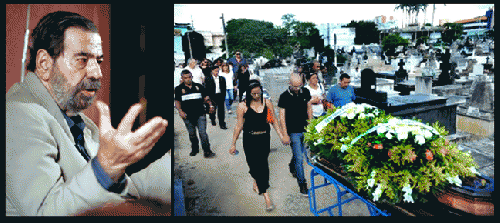They haven't killed him yet.
Paulo Malhaes, the confessed Brazilian torturer whose death I recently reported on this site may not have been murdered after all. At least that's what police investigating the case have been loudly proclaiming for the past week.
The former Army officer who had been an active agent of repression during Brazil's military dictatorship in the nineteen seventies was found dead in his home on April 25th. It was immediately and widely assumed that Malhaes had been assassinated by former comrades disturbed by his recent testimony before the Brazilian Truth Commission. But the police in Nova Iguacu, a commuter city on the periphery of Rio de Janeiro, are saying that Malhaes died of a heart attack while being restrained during a routine house robbery gone wrong.

Retired Colonel Paul Malhaes testifying last month and his recent funeral
(Image by unknown) Details DMCA
Based on what's being reported in Brazil and via international wire services, however, the line of inquiry being pursued by the police is so rife with contradictory evidence and unanswered questions that the case is already showing all the earmarks of a cover up, if not a full blown conspiracy. At this point it's still impossible to distinguish hearsay from fact, but the story goes something like this, beginning with a few scant details on the victim's background:
While on active duty in an intelligence unit more than three decades ago, Paulo Malhaes was in command of what the Brazilian Army dubbed its House of Death located in a mountain town near Rio, and where high profile militants involved in armed resistance were taken to be interrogated. Most never left alive, Malhaes has testified, and their bodies were partially dismembered, then dumped in a local river. "They paid a high price for playing cops and robbers with the Army," Malhaes once gloated to reporters of the Brazilian daily, O Globo. During his testimony Malhaes said he did not repent his acts, and would do it all over again. The former colonel did refuse, however, to provide the names of those with whom he served, which may have not been enough to save him.
Malhaes had retired from the military sometime in the early eighties. He settled in the rural zone surrounding Nova Iguacu on a property next to a local police official, who, it has been revealed, also served under Malhaes in the House of Death. The police official raised horses. One article from O Globo claims that Malhaes "imposed his violent brand of law on the region" by riding the dirt roads of his neighborhood on horseback hunting for drug traffickers. When he saw them he would take out his gun and begin to shoot. It was also reported that Malhaes grew close to a local chief of organized crime involved in the numbers racket, and that he stayed in touch with some of the interrogators who had been his subordinates in the army's torture unit.
This story about Malhaes as a commander of vigilantes until he was too sick and infirm to continue, as the reporter for O Globo put it, has been subsequently dismissed as untrue by a lead investigator on the Malhaes break-in, although the journalist who elicited this comment did not report how the cop came to draw this conclusion. The Malhaes' case is in the hands of a homicide division of the Civil Police that exercises jurisdiction in the Fluminense Lowlands, a county-sized subdivision within the state of Rio de Janeiro, and in which the eponymous capital and nearby Nova Iguacu are both located.
Malhaes had occupied the rural home in which he was found dead for thirty years. The location of the property is described as "solitary," accessible only from a dirt road. For the past nine years Malhaes had lived there with his third wife, Cristina Batista. His three marriages have produced five children, several of whom reside in the vicinity of their late father's house. In 2000 Malhaes ran for a seat on the Nova Iguacu city council and was defeated. Last month, after making public what Agence France Presse described as his "sickening catalogue of crimes," Malhaes, suddenly a household name throughout Brazil, was said to have no fear for his own security. Malhaes believed that his reputation as a local tough guy around Nova Iguacu would protect him.
I hope to discover more unsavory details on the life that Paulo Malhaes' lived as an alleged vigilante chieftain during at least some of his thirty years in Nova Iguacu. But the only additional information about him I can present here comes from reports of the crime scene where the police found his body last Friday morning, and from the subsequent and on-going investigation of that event.
To recap what I have previously reported, Malhaes, his wife, Cristina, and a handyman in their employ, now identified as Rogerio Pires, had been out and returned home last Thursday, April 24th, around two in the afternoon. Three intruders awaited them, one of whom wore a hood. Though I have not seen it reported, we must assume that they were armed. Malhaes was taken by two of the men to his office, while his two companions, escorted by the hooded man, were bound and sequestered in the master bedroom.
It wasn't until eight or nine hours later, if several reports I have read can be credited, that the thieves finally departed, carrying off two computers, a small amount of cash, some jewels and several fire arms that had belonged to the former colonel. We may also safely assume that Malhaes by this time was already dead. There is a gap in what has been reported thus far about how the police were summoned, and when exactly they arrived at the crime scene the following morning. All reporting I've seen agrees that Paulo Malhaes was found face down with a pillow over his head, and in one news account which appeared soon after his body was discovered, it was said the victim had "marks on his face and neck.' This led to the widely reported conclusion that Malhaes had been beaten and strangled to death.
Very soon thereafter, citing a medical examination of the cadaver conducted the same day as its discovery, police in charge of the case announced a scenario very different from premeditated homicide: that Malhaes, under extreme stress and perhaps subjected to rough treatment from his assailants, had suffered a heart attack. This provisional ruling on the causa mortis was deemed sufficient to authorize Malhaes' entombment at a local cemetery on the following day. 40 persons, mostly relatives, were said to have attended the funeral at which gospel songs were sung, leading me to wonder if the Malhaes family might not have embraced an evangelical Protestant sect, one of many that has made great inroads in this once all but exclusively Catholic country.
This rush to judgment on the cause of Malhaes' death, now being vigorously promoted by the police team controlling the investigation, was received with great skepticism in many quarters, not least among those who are currently conducting truth commissions all over Brazil. One truth commission lawyer, Jose Carlos Diaz, speculated that Malhaes may have been killed because "his former colleagues were worried" about what he might yet have intended to make public. Another commissioner, Antonio Dogo, feared Malhaes' death would have a chilling effect on others who were thinking about coming forward to testify. "People are going to think, if I open my mouth, someone is going to close it for good."
Brazil's federal police, similar to our FBI, were soon brought into the investigation by political pressure exerted by supporters of the truth commissions, to locate and ensure the integrity of any evidence the thieves may have neglected to remove, or what might be subsequently recovered, that would shed light on the crimes of the dictatorship. The feds made it clear that they had no jurisdiction over the actual crimes under investigation.
(Note: You can view every article as one long page if you sign up as an Advocate Member, or higher).




